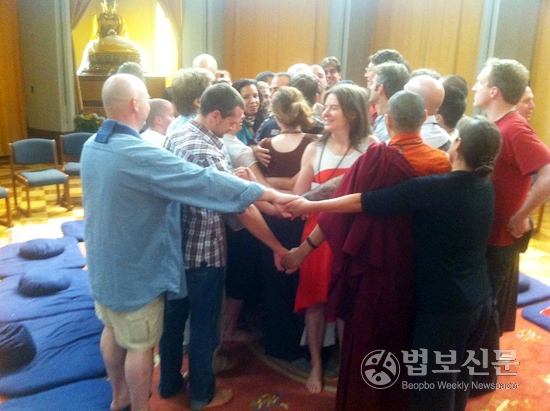서구 수행자들의 비사교성은 극단적인 수준
선방 떠날 때도 함께한 도반에게 인사도 안해
수행의 극적인 전환점은 도반의 조언서 시작
|
13년 전 내가 하버드 신학대학에서 불교를 공부할 때 ‘불교 윤리’ 과정을 수강한 적이 있었다. 지도 교수님은 하나의 과제로 미얀마 출신인 ‘사야도 우 판디타’(Sayadaw U Pandita)가 쓴 이름난 책을 소개했다. 그것은 ‘바로 이 생(生)에서’(In This Very Life)란 책으로 그 책을 탐독한 뒤 친구 및 우정에 관계되는 구절들을 찾아보라고 요구했다. 나를 비롯한 수강생들은 예상했다. ‘우 판디타’ 스님은 자신의 깨달음과 구제를 중심으로 하는 불교 종단인 소위 ‘소승불교’ 출신이기 때문에 우리가 찾고자 하는 구절은 많지 않을 것이라고. 그러나 실상은 달랐다. 놀랍게도 거의 몇 페이지 간격으로 ‘친구’에 관한 언급이 계속 이어지고 있었다. 교수님은 자신의 주장을 명확하게 밝히고 있었다. 즉 동굴에 앉아서 깨달음을 향해 명상 수행을 하고 있을 비구, 비구니 스님들에게 조차도 벗은 ‘불자의 길’에 불가결한 요소라는 것이다.
이 교훈은 오랫동안 나의 뇌리에 강하게 남아 있었다. 하지만 ‘벗’이 얼마나 중요한가를 이해하기 시작한 것은, 그리고 우리 서구 불자들이 영적인 길의 이 부분에 대해 정당한 관심을 갖지 못했음을 깨닫기 시작한 것은 최근에 이르러서였다. 나의 부모님이 인생의 완충기(緩衝期)를 진지한 수행으로 보내고 있었던 그 시절, 나의 삶은 뉴햄프셔의 근교 시골에 있는 영적 공동체인 선 센터에서 시작되었다. 생활이 그러했기 때문에 충분히 성숙된 영적인 삶은 아무런 뿌리도 없이 주어지는 것이 아니라 ‘공동체’라는 토양 위에서 꽃피워지게 된다는 사실을 나는 항상 ‘직관’으로 알고 있었다. 미국 전역의 많은 불교 센터와 수행 집단을 경험하면서 나는 공동체를 발전시키고 그에 따라 벗들을 사귀어나가는 일이 거의 관심을 끌지 못하고 있다는 것을 알아차리게 되었다.
우리 서구인들은 개인적인 깨달음 또는 아마도 중생의 구제를 위해서 오로지 명상 수행에만 관심이 있고 같이 했었던 주변의 그 누구에게도 거의 작별인사도 없이 선방을 떠나 버린다. 불교와 명상에 이끌린 사람들은 대개 내성적이긴 하지만 그렇다고 해도 서구 명상 수행자 집단의 비사교성은 ‘극단적’이라고 말할 수 있을 정도이다. 아시아의 불교 수행 생활에 대해 내가 관찰하기로 그들 대다수는 수행 공동체가 있기는 하지만 영적인 가르침은 오로지 위에서 아래로, 출가자로부터 재가자에게로 ‘전해진다’고 믿고 있었다. 그러나 영적인 친구 관계는 수평적 위치에서 친구로부터의 배움을 뜻한다. 내가 속하는 남방불교에서는 영적인 친구는 법우(法友, 팔리어 kalyanamitta : 선친우 善親友, 승우 勝友 또는 선지식 善知識)라고 부른다.
“어떻게 해야 참된 벗인가? 자! ‘비야가파짜’여(Byagghapajja : 부처님의 설법 대상자인 재가 불자의 성(性) 씨 ‘호랑이 발’ 또는 ‘호랑이 길’의 뜻임. 역자 주) 성숙된 덕목을 구비하고 신뢰와 도덕적 규율, 관대함 그리고, 지혜를 갖춘 사람이라면 그 가족이 사는 곳이 어떤 시골 마을이든 혹은 도시이든 관계없이, 또 그 주인 부부와 자식의 나이가 많고 적음에 구애받지 않고 그는 그들과 교제한다. 그는 그들과 대화하고 토론에 참여한다. 그는 신뢰와 도덕적 규율, 관대함 그리고, 지혜의 성취에 있어서 그들과 경쟁한다. 이를 일컬어 참된 벗이라 한다.”(증일아함)
내가 걸어온 불자로서의 길에서 의미 있는 ‘아하’라고 탄성을 지르는 깨달음의 순간들이 어디로부터 연유했는지 심각하게 돌이켜 생각해보면 대부분은 불자 친구와의 대화에서 비롯되었다는 것을 깨닫게 되었다. 나의 전반적인 불교 수행의 중요한 전환점은 불자 친구의 충고에서 비롯되었고 개인적인 수행담 그리고, 그들의 의견 등에서 찾을 수 있었다. 물론 각종 불교 서적과 법문, 위대한 스승들도 나의 마음을 열어주었다. 하지만 전체적으로 보면 결국 그 공로는 나의 벗들에게 돌아간다. 최소한 다음의 두 가지 이유 때문에 ‘그렇다’고 나는 생각한다.
그 첫째로, 책과 스승 등은 일반 대중을 위한 일반적인 가르침을 설하지만 우리의 구체적인 상황과 생각에 대응해주는 것은 친구들이기 때문이다. 또한 친구들은 우리 자신을 잘 파악하고 있고 우리의 일상적인 삶에 있어서 아주 작지만 중요하고도 구체적인 사건에 대응할 수 있는 적절한 충고를 어느 시점에서 말해주어야 하는지도 잘 알고 있다.
둘째로, 우리는 대개 친구에게는 어느 정도의 솔직함과 자연스러움을 갖게 되지만 우리가 스승들에게 조언을 구할 때는 그런 점들이 위축되어 조심스러워진다. 영적인 문제들을 숙고함에 있어서 격의 없는 대화 방식은 종종 놀라운 통찰력을 가져다주고 새로운 질문을 하게 만들기도 하고 마음 뒤편에서 이제 막 트이기 시작했으나 잠재돼 있었던 견해들을 불러내도록 만들기도 한다.
나의 글을 읽어왔던 독자들은 알고 있었을 것이다. 명상 수행법 외에 추가로 우리 재가 불자들이 우리의 일상생활에서 좀더 의식적으로 도입할 수 있는 수행법은 어떤 것이 있을까에 대해 숙고해왔던 사실을. 불교식 관대함의 범위는 금전적 보시보다는 훨씬 더 크고 넓다. 그것의 구체적인 방법으로는 자신의 시간에 관대하기, 타인을 돕기 위해 자신의 기술을 제공하기, 주변인들을 위해 인내하기, 마음으로 경청하기, 자신의 이익보다는 타인의 이익을 우선하기 등을 포함시킬 수 있다. 관대해지고자 하는 수행을 통해 재가 불자는 무아(無我)의 공성(空性)이라는 불교 가르침의 핵심 중의 하나에 대해 더 깊이 이해하고 더 잘 행동으로 옮길 수 있게 된다.
명상 수행이 우리의 영적인 길에 추진 동력을 제공하고 있음은 틀림없는 진리이다. 하지만 일상적인 세속 생활을 영위하는 우리 재가불자들은 명상 수행을 위해 항상 많은 시간을 할애할 수 있는 것은 아니다. 게다가 금융에 관해서 분산 투자를 하도록, 다양한 음식물로 식사하도록(예를 들어 쌀만 먹지는 말고), 다양한 분야를 공부하도록 권유해 왔듯이, 우리 재가자들은 다양한 ‘불교 수행 포트폴리오’를 개발하는 것도 고려해야 할 대목이었다.
|
수미런던 듀크 불교공동체 지도법사 simplysumi@gmail.com
번역 백영일 위원 yipaik@wooribank.co
다음은 영어원고 전문.
Spiritual Friendship
When I was studying Buddhism at Harvard Divinity School about 13 years ago, I took a course titled “Buddhist Ethics.” In one assignment, the professor had us read the classic book by Sayadaw U Pandita of Myanmar (Burma) “In This Very Life,” and then go through it to find all the passages that mention friends and friendship. Of course, we students expected to only find a handful of mentions because U Pandita is a monk from the so-called “hinayana,” or self-centered, tradition of Buddhism. To my surprise, nearly every several pages referred to friendship. Clearly, the professor had made his point: friendship is integral to the Buddhist path, even for the monks and nuns who supposedly sit in a cave and meditate their way to nirvana.
This lesson has stayed with me over the years but it hasn’t been until recently that I have begun to understand just how important friendship is and to see that we Buddhists in the West have not given this part of the spiritual path due attention. Because I began my life in a spiritual community, a Zen center in rural New Hampshire where my parents did some serious cushion time, I have always intuited that a fully developed spiritual life could not happen in a vacuum, that it had to flourish in a communal substrate. But I found, as I encountered many Buddhist centers and groups across America, that very little consideration is given to developing community and therefore friendships. We Westerners are all about sitting on a meditation cushion for our personal salvation and perhaps for all beings, and then leaving the zendo with hardly a hello or goodbye to the others around us. Granted, the kind of person who’s drawn to Buddhism and meditation tends to be an introvert, but the a-sociability of Western meditation groups is extreme. And from what I observe of temple life in Asia, there is community but many see spiritual learning as coming only from the top down, from monastics to laypersons. But spiritual friendship is about learning from side-to-side, from friend to friend. In the Theravada lineage I follow, a spiritual friend is called a kalyanamitta.
“And what is good friendship? Here, Byagghapajja, in whatever village or town a family man dwells, he associates with householders or their sons, whether young or old, who are of mature virtue, accomplished in faith, moral discipline, generosity, and wisdom; he converses with them and engages in discussion with them. He emulates them in regard to their accomplishment in faith, moral discipline, generosity, and wisdom. This is called good friendship.” ?AN 8:54; IV 281-85
When I really think about the origins of the most significant “aha!” moments in my Buddhist path, most of them come from conversations with Buddhist friends. Major turning points in my entire direction of Buddhist practice can be traced to advice, personal stories, and comments from Buddhist friends. Yes, books, dharma talks, and great teachers have also opened up my mind, but on the balance, the credit goes to my friends. I suppose this is so for at least two reasons. First, our friends respond to the particulars of our situation or thinking, whereas books, teachers, and so on are dispensing teachings for the general audience. Friends also know us well and know when to say the right thing, custom-tailored to minute but significant details in our lives. And second, we usually have a degree of honesty and spontaneity with friends that are more measured when we seek advice from teachers. The conversational mode of reflecting on spiritual questions often yields surprising insights, new questions, thoughts that had lain inchoate in the back of our minds.
Those of you who have been following my column know that I have been thinking about what practices, in addition to meditation, can we laypeople more consciously develop in our lives. Meditation certainly provides the electricity of our spiritual path, but those of us who are householders don’t always have time. Additionally, just as we are advised to have a diversity of financial investments, to eat a diverse diet (not just rice, for example), and to study a diversity of fields, so too should we consider developing a diversified Buddhist practice portfolio, if you will. In the last column, I looked at paying more attention to the practice of generosity. And now, I think, we can add to that array consciously cultivating friendship with Buddhists around us.



